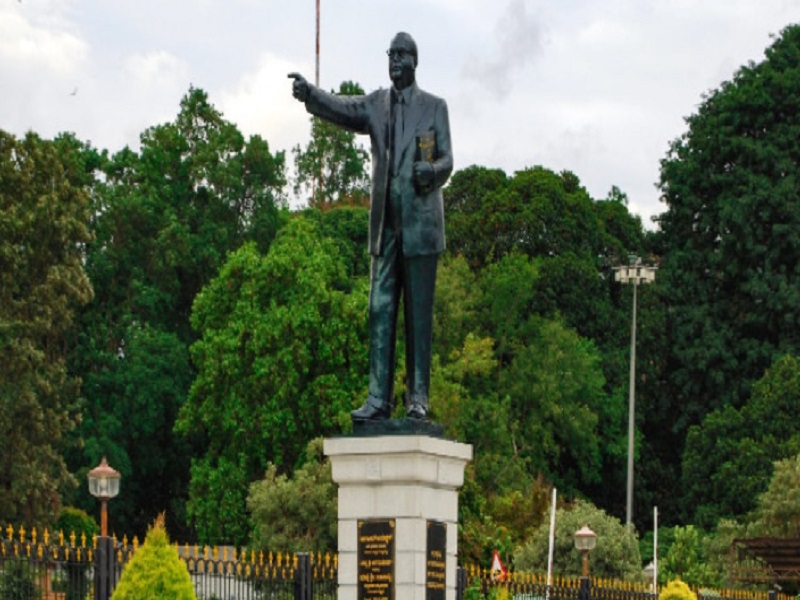Dr. Bhimrao Ambedkar has a lot of significance to bring the social reforms in our country. He played the key role in framing the constitution of India and was the Chairman of the Constitution Drafting Committee.
Born on April 14 1891, Babasaheb was an eminent jurist, historian and social reformer and was also appointed as the first Law and Justice Minister of Independent India by the first Indian Prime Minister Pt. Jawaharlal Nehru.
He was an avid social reformer who worked for the upliftment of dalits to bring them into mainstream society and raised his voice against the discrimination, he along with his community was facing due to Indian Caste System.
To mark his contribution and pay homage to babasaheb ambadkar, every year, his birth anniversary is celebrated throughout the country on April 14, which is celebrated as Ambedkar Jayanti, Bhim Jayanti or Equality day.
In this article, we are going to discuss 10 interesting facts about Babasaheb Ambedkar that will tell why he was considered the Symbol of Knowledge by people.
1- FIRST INDIAN TO PURSUE A DOCTORATE IN ECONOMICS ABROAD
Babasaheb was one of the few highest educated Indians of his generation. He was not only the first Indian to Pursue a doctorate in Economics but also the first Ph.D in Economics and the first double doctorate holder in Economics in South Asia.
He pursued 29 courses in Economics, 11 in History, 6 in Sociology, 4 in Anthropology, 3 in Politics; on each in elementary, French and German, during his 3 years in Columbia University.
He is the one and only person in the world to receive a valuable doctorate degree named Doctor "All Science" from London School of Economics, where he completed 8 years of studies in just 2 years 3 months.
2- KEY ROLE IN ESTABLISHMENT OF THE RESERVE BANK OF INDIA
Reserve Bank of India, which was set up on the basis of the recommendation of the Hilton Young Committee, was conceptualized according to the guidelines presented by Ambedkar to the committee in his book, The Problem of the Rupee - Its Origin and Its Solution.
3- CRUCIAL ROLE IN LEADING THE MAHAD SATYAGRAHA
To defy untouchability and reclaim public spaces for Dalits, On March 20, 1927, Dr. Ambedkar led thousands of Dalits to drink water from Chavdar lake of Mahad, Maharashtra. This landmark moment is known as the Mahad Satyagraha of 1927.
4- CHANGED THE WORKING HOURS IN INDIA
Ambedkar also played a key role in bringing about several labor reforms when he was the member for labor in the viceroy's council from 1942 to 1946. In the 7th session of Indian Labour Conference in New Delhi in November 1942, he changed the working hours from 12 hours to 8 hours.
He also introduced several measures for workers and laborers such as dearness allowance, leave benefit, employee insurance, medical leave, minimum wages and periodic revision of the scale of pay etc.
5- OPPOSED ARTICLE 370 OF THE INDIAN CONSTITUTION
Today most people don't know the fact that Ambedkar opposed Article 370 of the Indian constitution which gives special status to Jammu & Kashmir.
He refused to draft the article because he thought it was discriminatory and against the principle and unity and integrity of the nation. Eventually, it was drafted by former Diwan to Maharaja Hari Singh of Jammu & Kashmir, Gopalswamy Ayyangar.
6- FOUGHT AGAINST DROPPING THE HINDU CODE BILL FROM PARLIAMENT
Ambedkar fought for three long years when the comprehensive Hindu Code Bill was dropped by the Indian Parliament. The key purposes of the bill were giving equal rights to Hindu women and to abrogate social disparity and cast inequality.
As Ambedkar was the staunch supporter of women rights he resigned from his post of the first Law and Justice Minister of India. He also said "I measure the progress of a community by the degree of progress which women have achieved."
7- HIS AUTOBIOGRAPHY IS USED AS A TEXTBOOK IN COLUMBIA UNIVERSITY
After returning from America and Europe, Ambedkar wrote a 20-page autobiographical story titled Waiting for a Visa, in 1935-36. It is used as a textbook in Columbia University and depicts his experience of untouchability, starting from his childhood.
8- FIRST PERSON TO SUGGEST THE DIVISION OF BIHAR AND MADHYA PRADESH
Ambedkar suggested the division of Bihar and Madhya Pradesh in his book Thoughts on Linguistic States which was published in 1995.
In 2000, the split finally came with the formation of Jharkhand out of Bihar, and Chhattisgarh out of Madhya Pradesh, 45 years after he originally wrote the book.
9- MASTERY AT 64 SUBJECTS
Babasaheb Ambedkar was the one of the most educated persons India ever had. He was a master at 65 subjects and he also had knowledge of nine languages including Hindi, Sanskrit, Marathi, Gujarati, Pali, English, French, German and Persian.
Apart from that, for a 21 year long period, he also studied all the religions of the world in a comparative way.
10- TITLED AS BODHISATTVA
Ambedkar along with his wife and many followers left the folds of Hinduism and converted into Buddhism. In 1954, he was given the highest title of Buddhism called Bodhisattva, which means a person who is on the path towards Buddhahood in Kathmandu, Nepal by Buddhist monks.
Source: Jan Bharat Times0 COMMENTS



